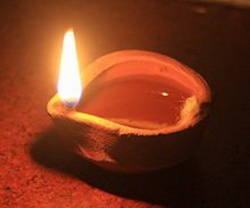Difference between revisions of "Dipa"
(Created page with "thumb|250px| <poem> '''dipa''' [灯明] (Skt, Pali; Jpn tomyo ) A lamp, light, or lantern. A lamp was regarded as an important offering to the Bud...") |
|||
| Line 1: | Line 1: | ||
[[File:Olilamp.JPG|thumb|250px|]] | [[File:Olilamp.JPG|thumb|250px|]] | ||
| + | |||
| + | |||
| + | |||
<poem> | <poem> | ||
| − | '''dipa''' | + | '''[[dipa]]''' |
| − | [灯明] (Skt, Pali; Jpn tomyo ) | + | [[灯明]] (Skt, [[Pali]]; Jpn [[tomyo]] ) |
| + | |||
| + | A [[lamp]], {{Wiki|light}}, or lantern. A [[lamp]] was regarded as an important [[offering]] to the [[Buddha]]. | ||
| + | |||
| + | After the time of [[Shakyamuni]], lamps were [[offered]] before [[Buddhist stupas]], images of the [[Buddha]], and [[sutra]] scrolls. The [[offering]] of [[dipa]] was believed to be a [[meritorious]] [[deed]] that brought [[benefit]] to the {{Wiki|donor}}. | ||
| + | |||
| + | The [[Sutra on the Wise and the Foolish]] tells the story of a poor woman who wished to offer an oil [[lamp]] to [[Shakyamuni Buddha]]. | ||
| + | |||
| + | She went out begging, but could gain only one coin. With that coin, she obtained a single oil [[lamp]] and [[offered]] it to the [[Buddha]]. | ||
| + | |||
| + | That night, though all the lamps [[offered]] by [[kings]] and other [[people]] went out, her [[lamp]] alone continued to burn throughout the night.This story is also found in the {{Wiki|Prophecy}} of [[Buddhahood]] for [[King]] [[Ajatashatru]] [[Sutra]], though it differs somewhat in its details. | ||
| + | |||
| + | In either version, it is widely known as "The Poor Woman's [[Lamp]]." | ||
| + | |||
| + | [[Buddhist sutras]] mention lamps with various kinds of oil. The [[Lotus Sutra]], for example, refers to lamps of [[champaka]] oil, lamps of [[sumana]] oil, lamps of [[patala]] oil, lamps of [[varshika]] oil, lamps of navamalika oil, and lamps of [[utpala]] oil. These [[Sanskrit]] names indicate the [[trees]] and [[flowers]] that produce the oil. | ||
| + | |||
| + | In [[Buddhism]], the [[lamp]] is compared to [[wisdom]], the "{{Wiki|light}}" of which dispels the {{Wiki|darkness}} associated with [[ignorance]]. The [[Lotus Sutra]] compares [[Shakyamuni Buddha]] to a bright [[lamp of wisdom]]. | ||
| − | + | The [[lamp]] of [[Dharma]] or the Law means the [[Buddha's teachings]]. The [[Mahaparinibbana-suttanta]], the [[Pali]] version of the [[Nirvana Sutra]], says that one should be one's [[own]] [[lamp]], and that one should take the [[truth]] as one's [[own]] [[lamp]]. | |
</poem> | </poem> | ||
{{R}} | {{R}} | ||
Latest revision as of 12:11, 8 January 2016
dipa
灯明 (Skt, Pali; Jpn tomyo )
A lamp, light, or lantern. A lamp was regarded as an important offering to the Buddha.
After the time of Shakyamuni, lamps were offered before Buddhist stupas, images of the Buddha, and sutra scrolls. The offering of dipa was believed to be a meritorious deed that brought benefit to the donor.
The Sutra on the Wise and the Foolish tells the story of a poor woman who wished to offer an oil lamp to Shakyamuni Buddha.
She went out begging, but could gain only one coin. With that coin, she obtained a single oil lamp and offered it to the Buddha.
That night, though all the lamps offered by kings and other people went out, her lamp alone continued to burn throughout the night.This story is also found in the Prophecy of Buddhahood for King Ajatashatru Sutra, though it differs somewhat in its details.
In either version, it is widely known as "The Poor Woman's Lamp."
Buddhist sutras mention lamps with various kinds of oil. The Lotus Sutra, for example, refers to lamps of champaka oil, lamps of sumana oil, lamps of patala oil, lamps of varshika oil, lamps of navamalika oil, and lamps of utpala oil. These Sanskrit names indicate the trees and flowers that produce the oil.
In Buddhism, the lamp is compared to wisdom, the "light" of which dispels the darkness associated with ignorance. The Lotus Sutra compares Shakyamuni Buddha to a bright lamp of wisdom.
The lamp of Dharma or the Law means the Buddha's teachings. The Mahaparinibbana-suttanta, the Pali version of the Nirvana Sutra, says that one should be one's own lamp, and that one should take the truth as one's own lamp.
